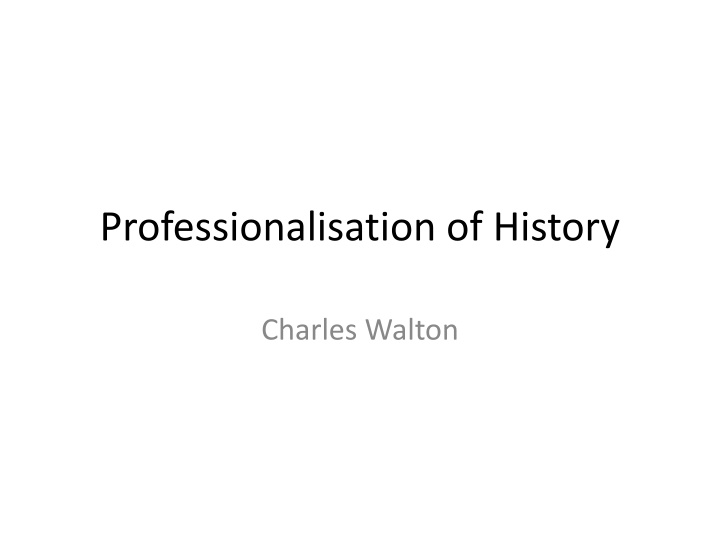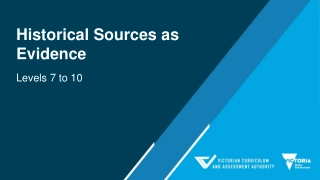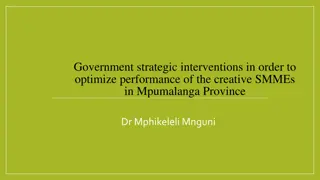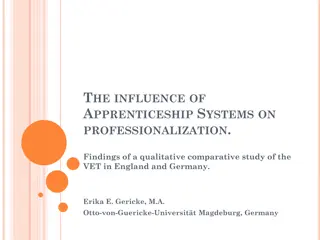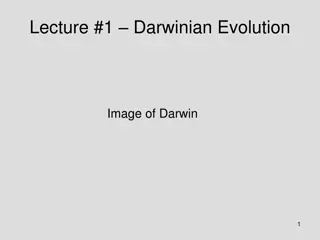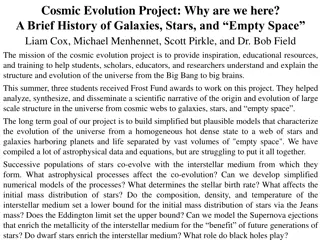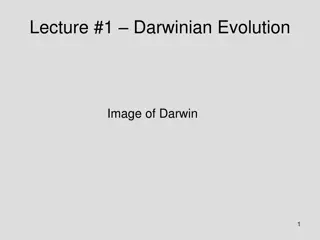Evolution of Historical Professionalization
The development of historical professionalization unfolded across various regions, from early forms in China and Europe to the establishment of academic positions in Germany and the US. The transition from memorialization to critical analysis, and the incorporation of research methodologies, significantly shaped the field of history.
Download Presentation

Please find below an Image/Link to download the presentation.
The content on the website is provided AS IS for your information and personal use only. It may not be sold, licensed, or shared on other websites without obtaining consent from the author.If you encounter any issues during the download, it is possible that the publisher has removed the file from their server.
You are allowed to download the files provided on this website for personal or commercial use, subject to the condition that they are used lawfully. All files are the property of their respective owners.
The content on the website is provided AS IS for your information and personal use only. It may not be sold, licensed, or shared on other websites without obtaining consent from the author.
E N D
Presentation Transcript
Professionalisation of History Charles Walton
Questions Where did professionalisation occur and why? What topics and approaches were institutionalised at the start? How did professional history relate to literature and science? How did professionalisation propel but also challenge notions of objectivity?
Early Forms: Regime historians China: Tang Dynasty (7-9 century AD) Court diaries, calendars Early modern Moghul Empire Chronicled reigns, helped define property rights Early modern European Dynasties Much the same as above History Office as part of State Draw up legal/administrative documents Chronicle the dynasty/reign Memorialisation and legal functions (memory, not critical history) E.g.: Voltaire, Royal Historiographer (appointed 1745)
Germany (or what would become Germany in 1871) First history positions: University of G ttingen, 1737 History developed along with Philology in the 18thcentury Systemized study of texts Classical Biblical Paleography, diplomatics, heraldry Point of it all Authenticity of documents!
History in Germany, 19thcentury Shift from mastering knowledge to producing original research Shift towards more intense criticism of texts and interrogation of their contexts Creation of public archives in Europe in 19thc
Elsewhere? France and US adopt German-style seminar/research model in late 19thcentury
France France before 1870 Weak universities Grandes coles founded by Revolution/Napoleon (but limited to few students elites who passed difficult exams) cole des Chartes: trained librarians/archivists After France s defeat to Germany in 1870-71 German model introduced to revived universities
US Ranke elected honorary member of the new American Historical Association in 1885 Undergraduate education Inspired by Britain: humanist tradition. Cultivate individual through general liberal-arts knowledge Postgraduate Inspired by Germany: critical research methods
Explosion of professional journals late 19thcentury Historische Zeitschrift (Germany, 1859) American Historical Review (1895) English Historical Review (1886) Revue historique (French, 1876) Rivista storica (Italian, 1884)
History as Science German influence on this point in 19thc. Rejection of imposing morality onto the past. To understand, not to judge Rejection of philosophical abstractions and generalizations of the natural sciences. Meditate on the particulars of history. The general spirit of the age will eventually come to you.
History as Science Critiques of this fact accumulation method Nietzsche: history is boring, meaningless chronicling Early Annales School (early 20thc) We MUST employ objective methods of generalization Facts won t spiritually commune with us rejection of German geist approach Drew on sociology, geography, ethnology Focus on peoples and not just wars, high politics and state institutions Post-WWII: Heyday of social scientific methods, quantitative, mass data
History and Literature Symbiotic relationship Professionalisation and popular history develop together! Proportion of history books in relation to all published books in France 1784-1788 17% 1825 27.1% 1909 30.3% After WWII, however, below 10%
History and Politics History and rise of the Nation-State Telling the story of nations or telling stories of nationalism ? Where does religion fit into professional history? How to describe the historical origins of the current political order? Problem especially for post- revolutionary France, where revolution was controversial How to characterise the nation Spirit (Germany) Tradition or political will (France)
History and Politicians Despite professionalisation, some history writers still came from politics or diplomacy Fran ois Guizot (French minister, A Popular History of France from the Earliest Times) E. H. Carr (diplomat) Winston Churchill (History of English-speaking Peoples) Cross-overs: Popular and professional Braudel, Ginzburg, Zemon-Davis, McPhearson
Impulse for objectivity US, late 19thcentury Grounds of authority of professoriate over students. (How can students refute objectivity?) Need to legitimize profession Generous book reviews too generous? But justified in the name of objectivity. Need for money, endowments Don t stir up too much controversy and scare donors Objectivity neutrality avoidance of controversy Need for national healing after Civil War Focus on institutions, heroic foundings
Objectivitys bias (US) Anglo-Saxon norms shaping objectivity Suppress racial/ethnic/gender differences Keep it uncontroversial Nationalization of history From The United States are (early 19th) to is (20th) Suppress regional differences
Objectivity questioned after WWI (US) Lowered wages for historians declining status Struggle for prestige, more critical of rivals Democratization of education 1890s: 3 in every 1000 were in high school 1920s: 30 in every 1000 were in high school Buyer s market: pressure to make history relevant Secondary educators had leverage over ivory-tower dons Desire for broader lens social history (esp after WWII) National tragedies and questioning of civilization after WWII
